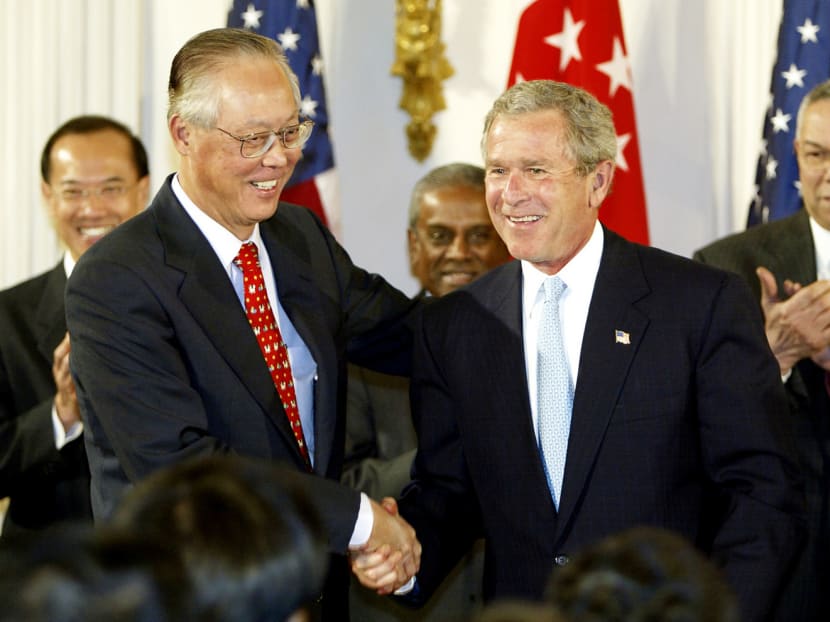Republic must forge ahead with creating global trade links
SINGAPORE — When one door closes, Singapore simply has to look for other openings, Finance Minister Heng Swee Keat said yesterday on the growing protectionist tide in Europe and the United States.

Then-United States President George W Bush and then-Prime Minister of Singapore Goh Chok Tong shake hands after signing the US-Singapore Free Trade Agreement (FTA) on May 6, 2003, the first FTA between Washington and an Asian country. Finance Minister Heng Swee Keat said that Singapore now has 21 FTAs. Photo: AFP
SINGAPORE — When one door closes, Singapore simply has to look for other openings, Finance Minister Heng Swee Keat said yesterday on the growing protectionist tide in Europe and the United States.
While Singapore has no influence on developments in the West, which have “significantly increased” global uncertainties, the country has to do what it can to deepen global links, Mr Heng pointed out.
He recalled how many people had scoffed at Singapore’s efforts to ink its first free trade agreement (FTA) with New Zealand in 2000. “People were laughing at what the FTA was all about — it’s just two tiny economies. It took us quite a lot of effort even to get the first free trade agreement done,” said Mr Heng, who was Permanent Secretary at the Ministry of Trade and Industry (MTI) from 2001 to 2005.
“In all the time that I was at MTI, we were negotiating one FTA after another, and it has continued until now. Now, we have 21 FTAs. So what it means is that even if one door is closed, we have to be prepared to look at where other doors can be opened,” he added.
Mr Heng was speaking at the press conference for the Committee on the Future Economy (CFE) report, addressing a question on how growing protectionism worldwide could affect one key prong of the CFE’s work — to deepen and diversify Singapore’s international connections. Trade is the lifeblood of Singapore, with about two-thirds of gross domestic product driven by external demand.
“The world saw a dark shift in mood away from globalisation in 2016,” the report said. “It no longer seems certain we are on an inexorable course towards greater globalisation, stronger multilateral institutions and a more connected world.
“Instead we saw nativist politics and protectionist economics growing in strength and influence in Europe and America. The anti-globalisation trend will undermine international trade, hurting all countries, but particularly small, open ones like Singapore.”
At the press conference, other CFE members also weighed in on the need to build resilience and be adaptable in such uncertain times.
“In a more volatile environment, a plan is but a basis for change. The ability to change and adapt is my superior sense-and-response capability,” said Minister in the Prime Minister’s Office Chan Chun Sing.
Minister for Trade and Industry (Industry) S Iswaran, who is also the CFE co-chairman, underscored the importance of being better prepared to take risks, whether by governments or individuals. “It is the attitude towards failure, or sometimes an effort not perhaps paying off, what do we do about it. The point we are trying to make here is we must be prepared to then learn from it, learn to fail fast, fail smart, and recalibrate and go down a new pathway,” he said.
Mr Teo Siong Seng, chairman of the Singapore Business Federation, said there are always opportunities, even amid growing protectionist sentiment.
“You look at Europe, you look at the US — that could be temporary. Some economies may have closed down, but that creates the opportunity for other economies to open up. Unless the whole world shuts down. When something closes, the other part will be more open. So we have to spot our chance and opportunity,” he said.
The shipping veteran noted how the industry faced its worst-ever year last year, but is now poised to recover after much consolidation in the sector.
“We have never seen such a bad market, but yet today, most shipping lines should be profitable. Because with all these changes, rates are now back to more normal levels, and PSA had a good throughput for December,” he said. “Business is always up and down, in times like these, we mustn’t lose focus, we must be confident.”






